Sussex Retold: Sounds, Sites, Stories
Learn about the Sussex Retold project, which is helping to rethink regional arts, crafts, folklore and music through participation, partnership and performance.
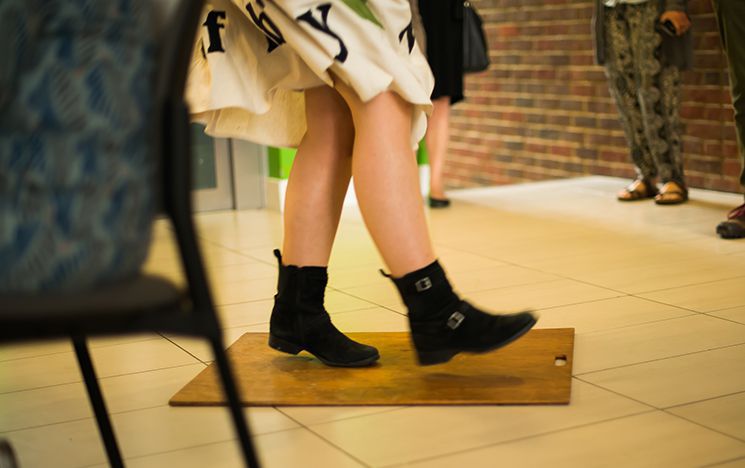
Image credit: Tunde Alabi-Hundeyin
About the project
The arts, crafts, music and folklore of Sussex speak to us about many people: land workers, townsfolk, farmers, shepherds, fishers, traders, migrants, makers, writers, story-tellers and singers. The Sussex Retold project explores ways to retell these stories from an inclusive perspective and reconsider where natural, cultural and regional heritages relate. Working with local cultural, council, and land organisations, we investigate how sounds, sites and stories can express how people have lived on and with the turf, chalk, cliffs and clouds of the region.
This project builds on a range of research projects across the University which explore the distinctive regional cultures of East and West Sussex and their local and global relationships. Through this, we hope to enhance local civic engagement and sustainable development in ways which benefit our partner organisations.
Call for contributions! Sussex Retold: Sounds, Sites, Stories, 19 June 2026 University of Sussex
We are seeking contributions for a conference investigating traditional arts, crafts, cultures and folk music in the Sussex region.
Speakers will include Anooshka Rawden, Cultural Heritage Lead for the South Downs National Park Authority; Alinah Azadeh, artist, writer and local cultural activist, Caroline Lucas, Professor of Practice in Environmental Sustainability at the University and former leader of the Green Party and MP for Brighton Pavilion; Matthew Bird, Director of Love Our Ouse and Lewes Town Councillor; Libby Drew, Director of the Knepp Wildlife Foundation and Sussex smallholder. The day will also premiere a site-specific drama about the history of Sussex-campus land by award-winning playwright Sara Clifford and music and dance from The Wilderness Yet, acclaimed young Sussex-infused folk stars. Other wonderful presenters to be announced in due course.
The conference will emphasise practical or collaborative knowledge. In addition to researchers, we are interested in hearing from dancers, artists, musicians, landworkers, farmers, rangers, archivists, craftspeople, curators and storytellers. We hope to challenge stereotypes of a pastoral and elitist county in a day of critical and celebratory work, ‘retelling’ Sussex through sounds, sites and stories.
Proposals of 250 words along with a brief bio and (if relevant) website address or reference to bibliography, should be submitted by 15 January 2026, on the following website:
Presentations will be on average 20 minutes in length. Registration fees apply but will be kept as low as possible.
- People
Read about the people involved in the project.
- Professor Margaretta Jolly (Principal Investigator)
Margaretta Jolly’s research on the theory and practice of life narrative and oral history supports the vision and application of this project in the context of a longstanding interest in Sussex folk heritages. She has explored these as methods for public and community engagement and as tools for enhancing and evaluating use and impact. - Dr Hope Wolf (Co-investigator)
Hope Wolf’s extensive inquiry into the visual art and crafts cultures of Sussex forms a bedrock for the project. Wolf’s work focuses on place-making as vital determinants of identity and community, exploring how these dialectically support creative innovation. Especially significant is her challenge to conventional and pastoral stereotypes of Sussex culture. - Dr Sam Carroll (Heritage Consultant and Project Manager)
Sam Carroll is an oral historian, project manager, learning facilitator, and community heritage consultant with twenty years’ experience across a diverse range of projects in both community heritage and academic research. She is director of Sweet Thames: The London Folk Club Heritage Project. Star Creative Heritage (National Lottery Heritage Fund), 2022 – 2023. - Professor Ed Hughes
Ed Hughes’s work as a composer and researcher also underpins the project. Hughes’ compositions in and about the Sussex landscape and South Downs are springboards for thinking about the relationship between music, song, dance, environmental conservation and farming. - Dr Chris Sandom
From the Sussex Sustainability Research Programme, Chris Sandom brings expertise in rewilding and land management. Within the SSRP’s South Coast Sustainability theme, he has worked specifically on the issues, visions and futures of the downland in Sussex and especially within the City Downland Estate, owned by Brighton & Hove City Council. - Dr Perpetua Kirby
Perpetua Kirby, also within the Sussex Sustainability Research Programme, draws on educational philosophy to hone a practical approach to urgent sustainability challenges, including with school children and those involved in farming and land-use. Her 2023 Open Press book, Creating with Uncertainty: sustainability educational resources for a changing world, edited with Rebecca Webb was produced collaboratively including with Jo Walton and Michael Jonik. - Dr Jo Walton
Jo Walton works in climate communication, including through science fiction, serious games studies and other creative methods. With Chris Sandom, Perpetua Kirby and Dan Locke he has supported 24 Hours to Envision a Sustainable Future. - Dr Laura Kounine
Laura Kounine specialises in the history of witchcraft and lore. She focuses on gender, emotions, selfhood, crime and conflict and early modern witch trials. She also explores methods involving historical self-narratives and oral history. - Dr Fiona Courage
Fiona Courage, Director of the Mass Observation Archive, specialises in its uses in educational contexts, and also, as Deputy Director in the Library, will facilitate showcasing of heritage including the Copper Family papers in our Special Collections. - Professor Ben Rogaly
Ben Rogaly has extensively researched community development and regional identities with a particular interest in how participatory oral history methods can illuminate the interests of migrant and minority peoples. He also exposes the racial capitalism involved in agricultural work.
Other academics at Sussex with relevant interests include:
- Professor Alice Eldridge, who researches local and global landscapes through ecoacoustics
- Dr Karis Petty, who works on perception of the South Downs landscape for walkers who have impaired vision
- Dr Jamie Barnes, who explores ecological sensibilities and post-human perspectives including at Wakehurst Gardens.
- Professor Margaretta Jolly (Principal Investigator)
Sussex Retold is supported by the Centre for Life History and Life Writing Research, the Sussex Centre for Modernist Studies and the South Coast Sustainability group within the Sussex Sustainability Research Programme.
We also acknowledge and thank our funder, the Arts & Humanities Research Council (AHRC) Impact Acceleration Account (IAA).
We will be working under three headings from 2024-2026:
Diversifying Ditchling: Sharing new arts and crafts stories within and beyond the Guild
Ditchling Village and Ditchling Museum of Art + Craft showcases the artists and craftspeople who made Ditchling a creative hub in the 20th century, as well as contemporary practitioners whose work reverberates with their historic work. We are working with the museum to support its interests in community involvement, including through an oral history. This work draws specifically on Hope Wolf’s research and the oral historian is Sam Carroll. Find out more in Hope Wolf’s blog and listen to short excerpts from the oral history here.
Storying Downland cultural heritage
We are working with local partners to explore the Downland landscape and cultural history of the South Downs in ways which reflect multiple heritages and inclusive regional and national identities. The South Downs Songbook - a music and composition project in schools and colleges - with composers Ed Hughes, Evelyn Ficarra, Rowland Sutherland and Shirley J. Thompson – is an inspiration. Its album Distant Voices, New Worlds was ‘contemporary music album of the month’ in November 2024, reviewed as ‘English to its core’ yet defying tradition. The Songbook was performed at Towner Gallery in July 2025 – a sold out concert whose powerful effects are reviewed with here. Four workshops across Sussex addressed state schools including Crawley which has some of the most deprived neighbourhoods in England; students reported not having visited Beachy Head. The focus of those workshops and performances was on developing students’ confidence to respond to a poem (Beachy Head, by the 19th century writer Charlotte Smith) using their own creative methods. Sussex Retold’s engagement with Towner in Eastbourne was also supported in relation to an original day course, Rifted Shores, This drawing workshop was led by Catherine Anyango Grünewald, an internationally exhibited artist who has created adaptions of literary texts, translated into multiple languages. Sussex Modernism curator Dr Hope Wolf and literature professor Dr Andrea Haslanger provided insight into the poem and its connection to the exhibition Sussex Modernism.
Composing sustainable landscapes in the South Coast through film, folk song and farming heritage
This work brings together the interests of three partners: Sussex Traditions, Land Use Plus and Writing Our Legacy.
Sussex Traditions
The Sussex Traditions approach is described in Steve Roud’s assertion that “it is not the grand issues of life which worry us here – they can look after themselves – but the lives of the ordinary people which are often allowed to be forgotten” (“Who Cares About Tradition?”).
Land Use Plus
Land Use Plus is part of the Brighton & Hove Food Partnership. It aims to connect points of view from a wide range of people to create multiuse land. This land could provide food, spaces, opportunity for education and greater connectivity, whilst protecting and restoring nature. It is working with farmers, the council and others to improve food production practices that impact on climate change.
Writing Our Legacy/Changing Chalk
Changing Chalk is a National Trust led initiative that connects natural and cultural heritage to support Downland conservation. Changing Chalk has collaborated with Writing Our Legacy (WOL), a Brighton-based arts and heritage organisation. The WOL Changing Chalk programme was commissioned to “engage the general public and writers, creatives and audiences from the Black, Asian and ethnically diverse communities, connecting them to the unique chalk grassland of the Sussex Downs and the communities of the urban coastal fringe of Brighton & Hove, Lewes and Eastbourne, through literature, creative writing, storytelling and other arts and cultural activity.” They have supported (with others) “We Hear You Now: A spoken word audio journey around the Seven Sisters and Sussex Heritage Coast” with the South Downs National Park’s Writer-in-Residence Alinah Azadeh.
This work draws upon Jolly’s knowledge and networks, including the Centre for Life History and Life Writing Research’s conference Locating Women in the Folk. Sam Carroll and Laura Hockenhull are also key to these activities.
Past and upcoming events
See some of our event highlights:
-
Rifted Shores: Drawing in Response to Sussex Poetry: In this day course, learn about the art and literature of Beachy Head and the Seven Sisters as you develop visual responses to Charlotte Smith’s nineteenth century poem. A drawing workshop will be led by Catherine Anyango Grünewald, an internationally exhibited artist. Sussex Modernism curator Dr Hope Wolf and literature professor Dr Andrea Haslanger will provide insight into the poem and its connection to the exhibition Sussex Modernism.(Saturday 31 May 10:00 until 16:00, Towner Eastbourne)
- Scholars of Simplicity: Celebrating the Coppers with Sussex Traditions (22 November 2024 to 22 April 2025)
- Regional Arts and Archives (from the ‘Harnessing Heritage’: Resources from the EARC Conference 2024, 3 September 2024)
- Locating Women in 'The Folk' – An interdisciplinary conference. Perspectives on women’s contributions to folk song, folklore, and cultural traditions (9 June 2018).
Explore our gallery of images from past events
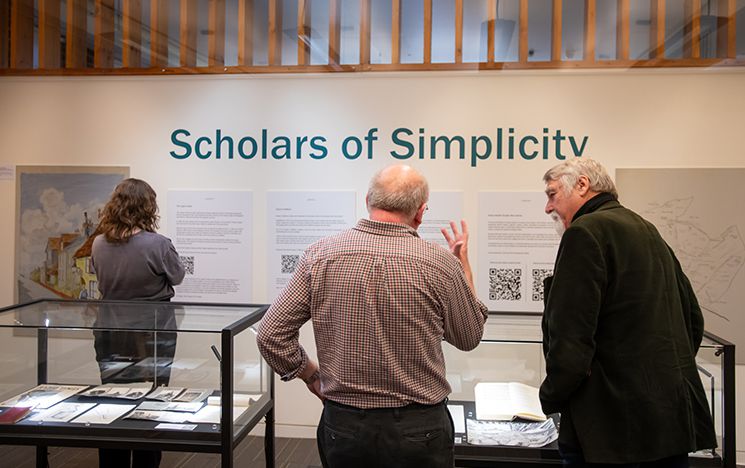
Jacqueline Faulkner, Sean Goddard and Jon Dudley enjoying the exhibition (© Tunde Alabi-Hundeyin II)
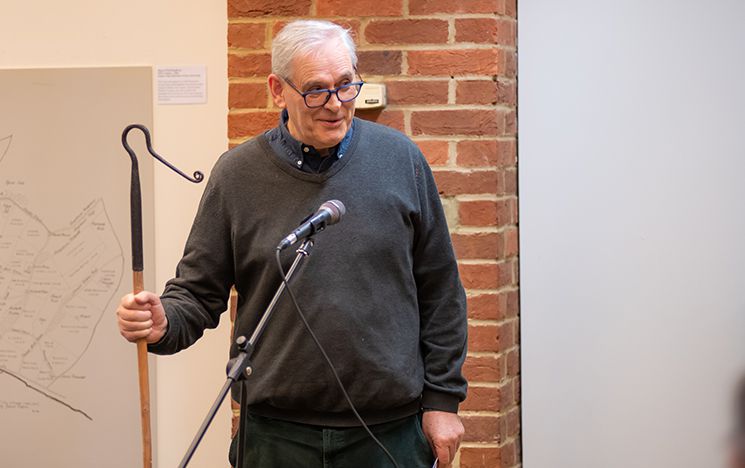
Mike Tristram, Chair of Sussex Traditions and local farmer (© Tunde Alabi-Hundeyin II)
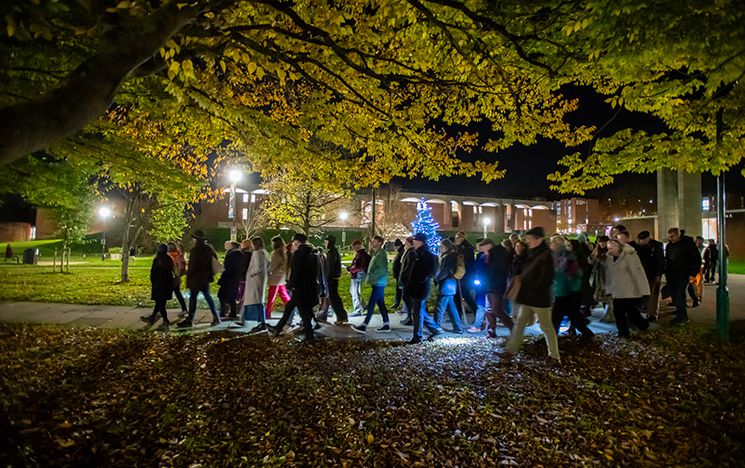
A lantern-lit singing walk from the library on campus to The Swan Inn in Falmer village (© Tunde Alabi-Hundeyin II)
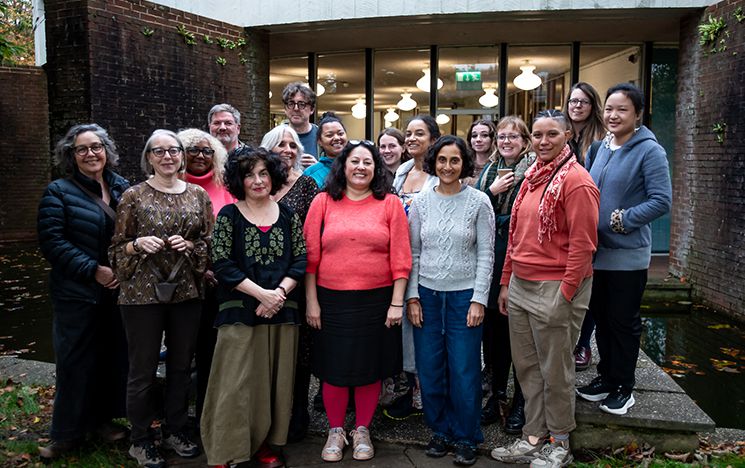
Speakers and walkers from Whose South Downs? (© Tunde Alabi-Hundeyin)
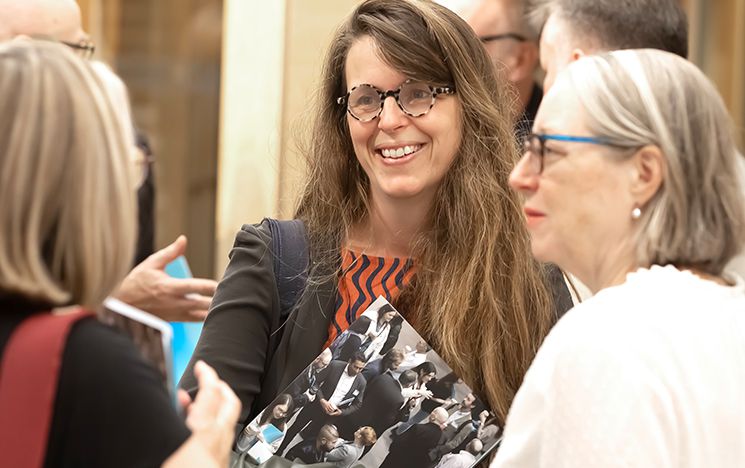
Medeni Fordham, Hope Wolf and Margaretta Jolly at Harnessing Heritage (© Steve Brading, UEA)




